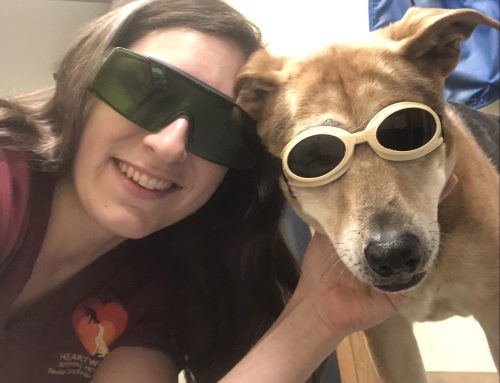Finally, the warmth has returned to Youngsville, NC and all of our furry friends are two-small-dogs-playing-in-park-300x201enjoying the spring weather. With increased time spent out in the backyard, you may begin to notice more scratching, reddening of the skin, and some hair loss. Allergies is a very common skin issue in our pets and this blog post will be aimed at informing you about the 3 main types of allergies that most frequently affect our dogs
Food Allergies are the least common of the three allergies in dogs. Animals that have a true food allergy are allergic to the protein present in the food. To this date, there has been no evidence that supports the presumption that dogs are allergic to the carbohydrates from grains in the food. Signs of a food allergy include itchy skin (especially of the muzzle and feet), ear infections, and frequent gastrointestinal upset. Treatment of a food allergy is done with a diet trial using a new protein source that your dog won’t be allergic too. This diet is fed over 6-8 weeks to see if any improvement of the skin is noticed. It is very important to note that absolutely NO other food or treats must be given during this time. Many of the food allergy prescription diets also contain many omega 3 fatty acids which promote skin health and a very shiny fur coat.
Flea hypersensitivity is the most common allergy seen, but fortunately is the easiest one to prevent. Similar to poison Ivy in humans, how intense of a reaction develops from fleas depends on the individual. For example, a dog in Louisburg may be bitten by 12 fleas and have very little skin issues. However, another dog in that same Louisburg neighborhood may just need one bite by one flea for it to cause a huge reaction including hair loss, skin infection, and intense itching of the area. Prevention is maintained by ensuring that all pets in the household are on a monthly flea and tick preventative to prevent a flea infestation from occurring.
Environmental allergies are the third major cause of itchy skin in dogs. Similar to food and fleas, environmental allergies can lead to major itchiness, reddening of the skin, and constant ear infections. Dogs can be allergic to certain trees, grasses, molds, weeds or mites. For many of these things, there will be a seasonal component where the symptoms. Fortunately, there is an inexpensive screening test for allergies that can be run on a small sample of blood to let us know if the environment is causing some allergic issues. If this screening test comes back positive, then formulating a specific allergy vaccine treatment for your pet may greatly improve your dog’s clinical signs. There are also other new immune therapy target treatments, such as Apoquel, which may help with treatment of environmental allergies.
At Heartwood Animal Hospital, we have helped many dogs with their itchy skin and have seen how it positively affects their overall behavior and wellness. Please call us at 919-570-9311 for questions on itchy skin and how the Heartwood team can help make springtime a fun time, not an itchy time, for your pet.







Leave A Comment